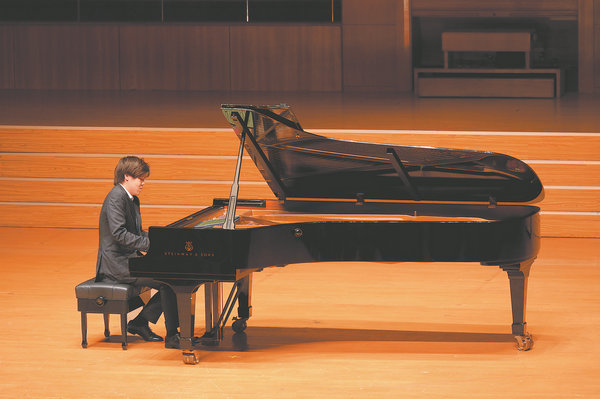

To celebrate the 190th anniversary of German composer Johannes Brahms' birth, young pianist Sun Yutong was ambitious in leading his audience through pieces from the composer's later years.
Created between 1892 and 1893, the 20 pieces from Op 116-119, ranging from capriccio, intermezzo, romance, rhapsody to ballade, were the composer's last works for solo piano.
"I hope, through these piano miniatures, I can bring my audience into the world of Brahms' introspection of later life," Sun said before a recital at the Beijing Concert Hall on Aug 19.
The pieces were written at a time when the composer, having witnessed the passing of family members and close friends, looked back at his own life and reflected on life, love and death.
In contrast to his grand and meticulously structured earlier works, Brahms expressed his most intimate feelings through these short pieces, Sun says.
Usually, musicians play two opuses as half of a recital to balance the time duration. However, Sun played Op 116 first, and after a pause, continued the concert by Op 117-119 without any further intermission.
"I think the latter three pieces are more suitable to be heard together," he says.
While Op 116 is intact with a clear beginning and ending, Op 117 is more like an introduction, and the ascending arpeggios at the end of Op 118 and descending broken chords at the beginning of Op 119 echo one
another, he adds.
Like many, the 28-year-old usually has a preference for the midterm and later works of composers, which tend to be considered more mature.
As a young pianist, he would therefore make up for the gap in his age and life experience by reading biographies and history, and learning the composers' earlier works to better understand their consistency in style and changes in mindset.
Brahms' later works reveal the depth of his compositional skill and his inner musings. Unlike his ambitious orchestral compositions, these 20 pieces feel more spontaneous, as if they were created without much deliberation, Sun says.
"For me, the real challenge lies in finding a way to perform them with a simplicity that highlights their essence, rather than getting lost in their complexity."
Sun is also attracted to the interpretations of late Canadian pianist Glenn Gould and Russian pianist Daniil Trifonov, both of whom are known for being good at deconstructing music with which people are familiar.
He quotes his mentor at the New England Conservatory of Music in Boston, Vietnamese-Canadian pianist Dang Thai Son: "In art, we are transparent."
"Playing piano, for me, is to faithfully convey my understanding of the works and the composers and to try my best to maximize personal temperament so that the audience can feel something fresh," Sun says.
The past summer saw him tour around the country, playing in cities including Beijing, Shanghai, Guangzhou and Shenzhen, giving recitals of Brahms and dual piano concerts with his fiancee Guo Xu, a doctoral candidate at the Eastman School of Music in Rochester, featuring the works of Sergei Rachmaninoff. This year also marks the 150th anniversary of the composer's birth.
Chinese audiences got to know Sun through the 18th International Fryderyk Chopin Competition in Warsaw in 2021.
In the first round, he walked onstage, bowed, sat down, adjusted his seat, and without any hesitation, started right away with Chopin's profound Ballade No 1 in G minor, Op 23, delivering it with a sprezzatura expression.
He exited the competition in the second round, though he seldom mentions that he was hit by a car and was injured the day before. On Bilibili, videos of him playing are among the most viewed of all the competitors.
It was also via this competition that Sun's agent Zheng Jian got to know him. "I was impressed by his casualness and deeply attracted by his understated yet personal renditions, although I was aware that some relatively conservative judges might disagree with him.
"I know the pieces well and I wanted to hear something new, but convincing. He made it," says Zheng, who reached out and invited the young pianist to play some domestic performances.
During last year's Van Cliburn International Piano Competition in Texas, he was the only Chinese candidate to get to the semifinal.
Sun's repertoire spanned major Western classical music periods, from George Frideric Handel's Chaconne in G Major, HWV 435, pieces of Beethoven, Mozart, Chopin and Isaac Albeniz, to contemporary works from Gyorgy Ligeti, Stephen Hough and Carl Vine.